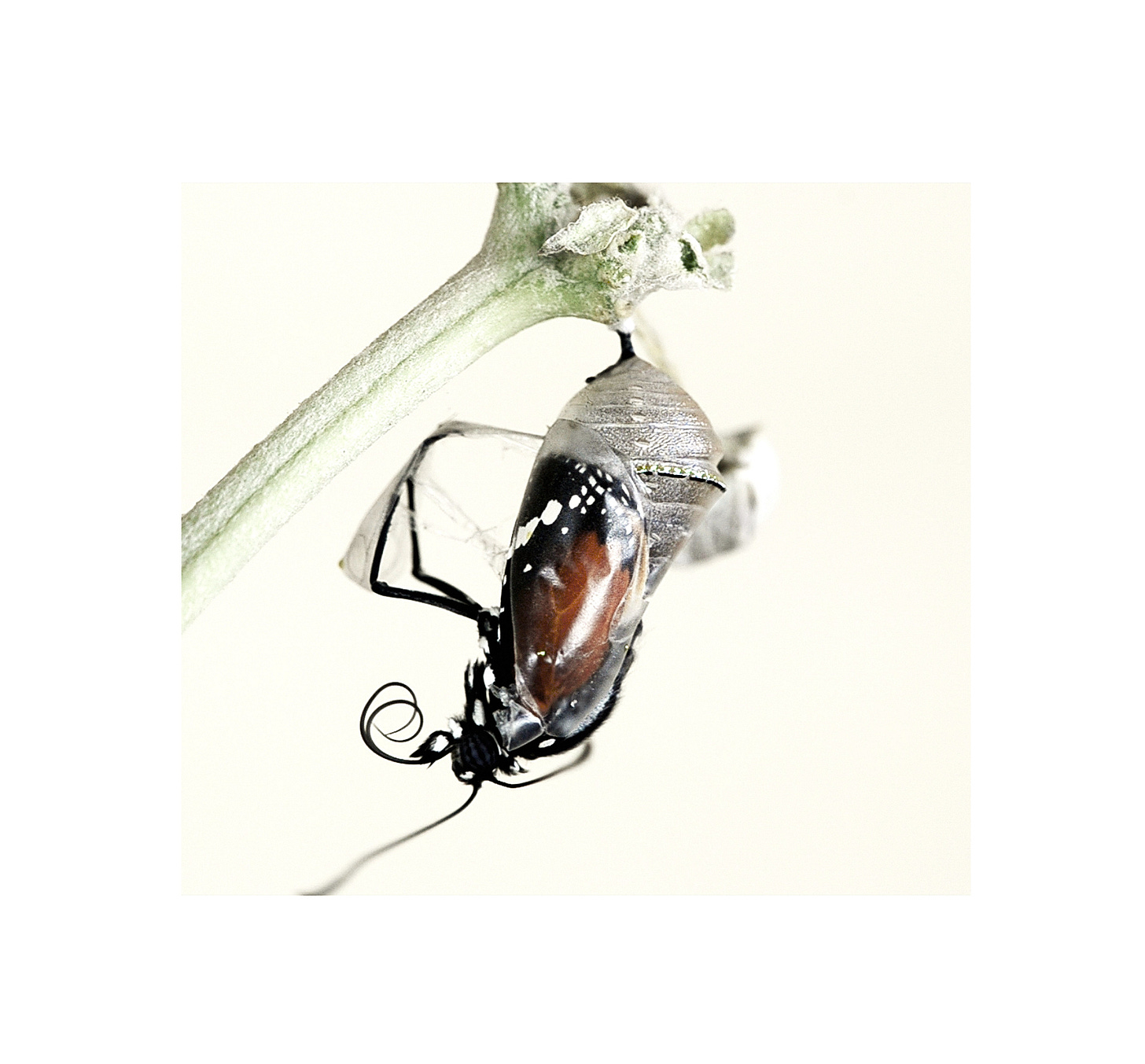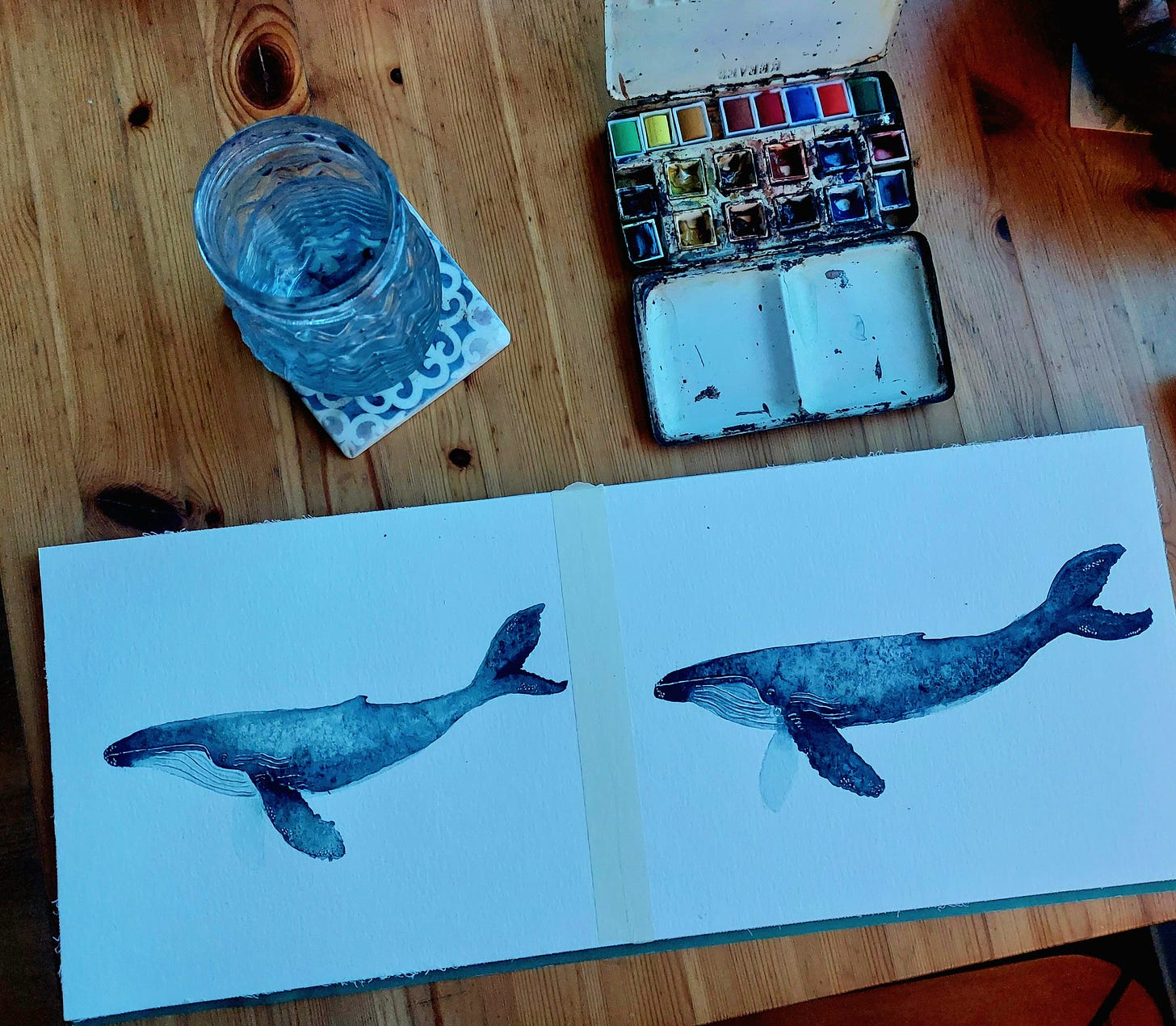Within the dark womb of its cocoon, a caterpillar begins the process of re-becoming. Many of its tissues break down into a sort of cellular soup, and from this soup emerges an alien body, a sky-bound body, a body prepared for a completely foreign sort of life.
In many ways the caterpillar, through the process of metamorphosis, becomes an entirely new being.
The first time I witnessed such a transformation, I must have been about seven years old. An emperor dragonfly emerged from its larval skin on the brick wall of our garden pond, and I watched the entire process—the split of the larval exoskeleton; the unfurling of the dragonfly’s abdomen; the wet, weak, newborn body gradually expanding into the ferocious beauty of its adult form.
If ever someone says that the world holds no magic, they must be made to witness a winged being unfurl from its ground-bound body—a dragonfly erupting from its larval skin, or a butterfly uncurling from its cocoon. Who could deny the sensation of freedom and wonder and electricity that such a sight elicits? Who would deny that it is magic?
But let me tell you of something that seems even more like magic to me. Beyond one body transforming into another, beyond wings emerging from cellular soup, there is this:
A butterfly remembers life as a caterpillar.
A butterfly, a being that has been rearranged, remade, reborn, remembers what it was before.
I know this because, a few years ago, I woke up with an experiment in my mind. In that period of time, as my great aunt became lost in the strange fog of dementia, I had been thinking a lot about memory, about what it means to be who we are and who we are if we do not remember, and it occurred to me, in my half-waking state, that butterflies probably do not remember anything from their life as caterpillars. How could they? How could anything become cellular soup and still retain a sense of who it used to be?
I am not sure, even still, that I fully understand why it seemed so important to me to find the answer to this question, but it did, and over breakfast that morning I searched google scholar to see if anybody else had had the same idea.
Of course, they had.
Years before, a team had tested this very question1. And what they found is that a caterpillar, despite its whole body rearranging, does retain its memories—a caterpillar taught to dislike a specific odour will retain this aversion through metamorphosis and into adulthood.
That a body can be destroyed and remade, but still hold onto its lived experience—this settled inside my mind like a sliver of gold.
I could not say why, but it did, and there it remains.
And there is also this: last year, researchers discovered that kidney cells hold a sort of memory once thought to be unique to the brain2. It is not only our brains that hold onto lived experience.
And then, this week, I learnt something entirely new about the cellular make-up of our bodies, and this, too, slivers gold inside my mind in the same way as butterfly memory, as kidney cells: I learnt that each human body is more of a chimera than we ever knew3.
In the womb, we exchange cells with our mothers, but also with other cells our mothers hold. Because our mothers were in the womb of our maternal grandmothers, and exchanged cells with her, we hold our maternal grandmother’s cells, too. And because our mother’s older siblings were in our grandmother’s womb before her, it is possible their cells went to our mother, and then to us, and the same too for our older siblings—their cells are in our mothers, and could therefore be passed to our bodies.
Theoretically, then, my body could hold the cells of my mother, older brother, four uncles, my maternal grandmother, even my great aunt, my great grandmother.
We do not know if these cells do anything—as in, whether they are active or dormant, if they have any function or none at all—but they have been found integrated into many organs. Thyroids. Pancreases. Hearts.
We are not only ourselves.
And then of course (another sliver of gold) there is epigenetics. A whole field we are only just beginning to grasp. A whole field that has found that the lived experience of our ancestors is passed down to us in the form of molecules attached to our DNA4, and that these molecules have significant effects on both our physiology and our psychology.
If your grandmother lived through war, this is etched into your cells, your behaviour, your mind.
If your grandfather lived through famine, so is this.
The point I think I am making here—and forgive me, the point is a scattered one, a point I am writing around because I am still trying to find it—is that we are still learning, and have so much to learn, about what our bodies hold. About how memory is held in a body. About who else’s memories reside within our flesh.
The point I think I am making is that memory is not (always) a fickle thing, and nor is it (always) a fragile thing. We hold the passage of our own lives, and the passage of lives that have gone before us, within. We carry memory. We have no choice in it. And those memories connect us both backward and forward in time.
Yes, the point I think I am making is that we are never alone, we are never unconnected, and we are never anything other than exactly who we are—a tapestry, a thread in a web, a part of something vast and expansive and more complex than we will ever truly grasp.
We may metamorphose, we might even grow wings, but we are grounded, always, in history. In histories.

I was thrilled to be interviewed by
for her Reciprocity series. You can read the interview below (and also check out Homecoming, Julie’s brilliant substack).If you enjoy between two seas, would you consider a paid subscription, or leaving a tip? This allows me to keep writing.
If you’d like to become a founding member of between two seas, and receive an original watercolour as a thank you, you can find this option by clicking subscribe/upgrade above.
https://journals.plos.org/plosone/article/file?id=10.1371/journal.pone.0001736&type=printable
https://www.sciencenews.org/article/brain-kidney-cells-memory
https://www.theatlantic.com/science/archive/2024/01/fetal-maternal-cells-microchimerism/676996/
A simplification, of course. If you’d like to read more, this is a great place to start: https://www.genomicseducation.hee.nhs.uk/education/core-concepts/what-is-epigenetics/







Some days I find the only thing more remarkable than our natural world is our ability to maintain the illusion of separateness - from each other, our deep history and every ancestor who helped us over the wall to get here.
I just learned that plants have memory, too!
I’m reading The Light Eaters by Zoë Schlanger, a book on plants and what they can do. It’s truly amazing, great writing combined with mind blowing revelations, all based on science. You will never see your house and garden plants the same way again.